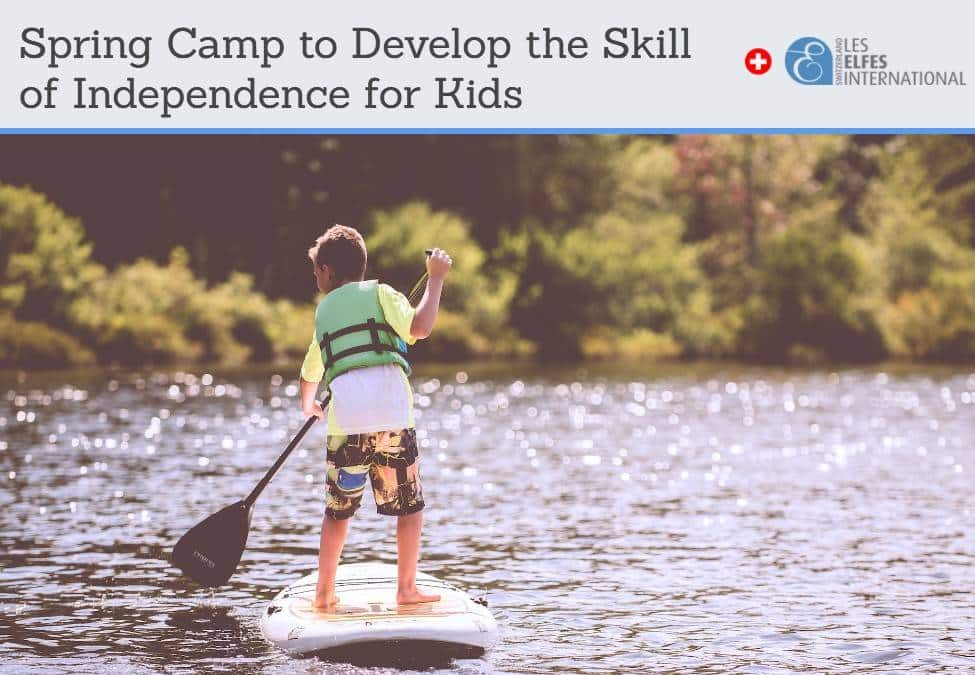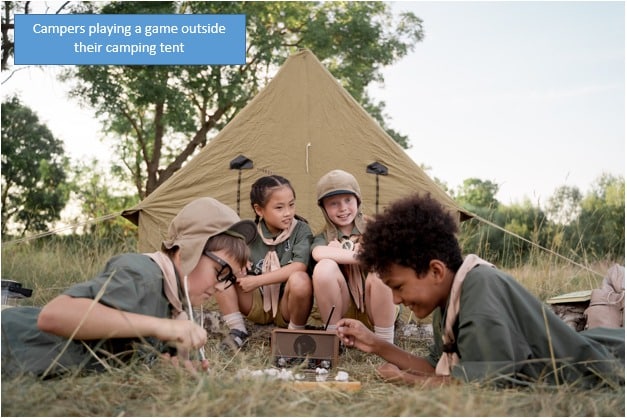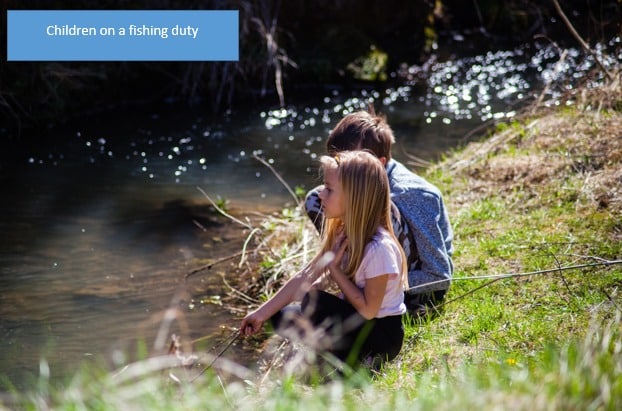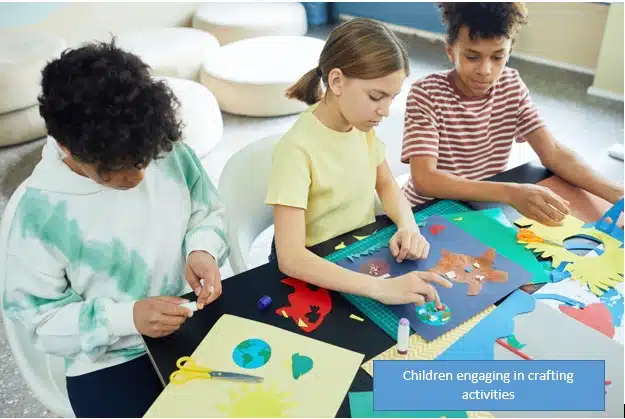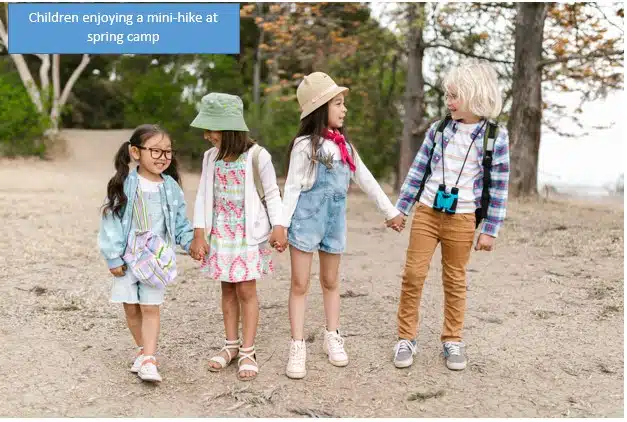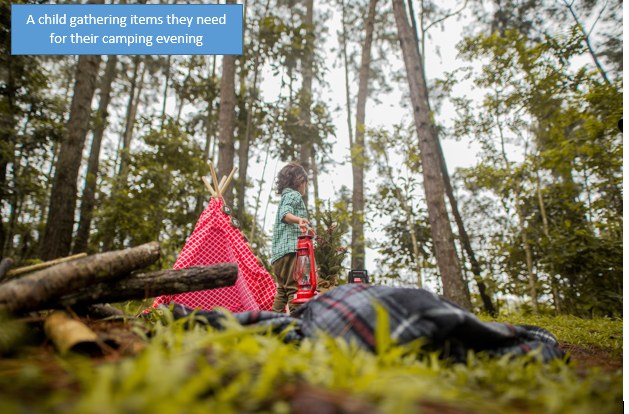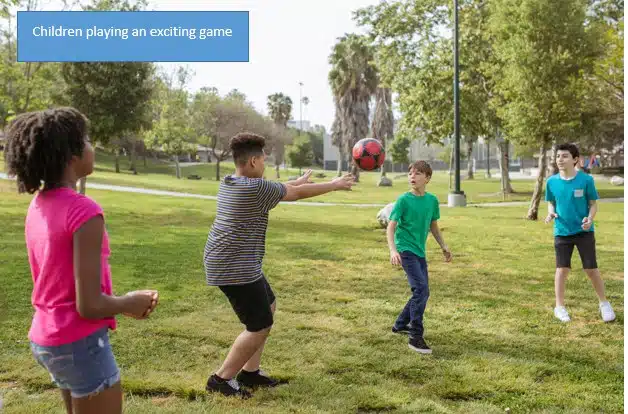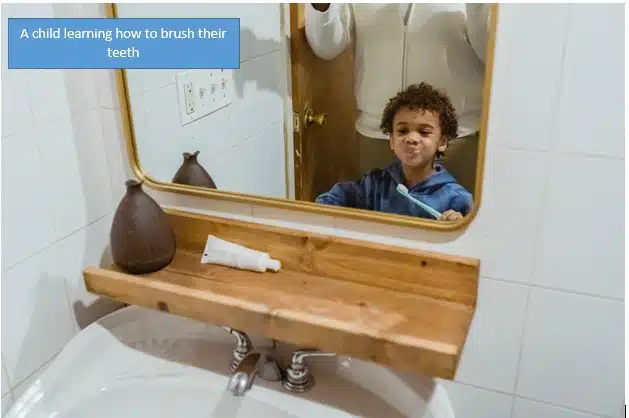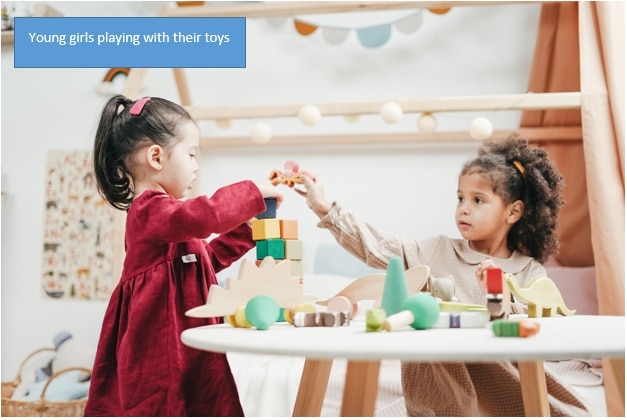Independence for kids involves:
- Being responsible.
- Trying new things.
- Determining who they are or what they want to become.
- Making decisions on their own
Achieving independence for kids help children navigate their journey to growing up and eventually adulthood. Children with a sense of self-efficacy and independence are great at managing stress, developing their identity, and building relationships with others.
Being independent is critical to a child’s perseverance and motivation in school. When children are motivated and learn independence from within, they have a high chance of succeeding academically. Sending children to a spring camp is one of the effective strategies parents can use to encourage independence in their kids.
While at the camp, children will have more control over their lives away from their parents. They will also be more confident in decision-making. Independent children can have more empathy and self-awareness.
While learning how to be independent, children will develop other critical skills such as self-motivation, cooperation, and concentration. Read on to learn why spring camp develops the skill of independence for kids.
Benefits of Independence for Kids
Allowing your children to learn new activities independently can be crucial for their emotional, social, and personal development. Knowing your children can solve minor problems prepares them to reason for themselves and prepare to face and solve bigger challenges. According to research, recognizing and promoting independence in your children is crucial. As a parent, you should desist from doing everything for your child lest you hinder their learning process. Enabling independence from an early age paves was for unending learning. Here are the benefits of independence for children.
Children Gain a Voice
Sending your child to spring camp allows them the liberty to practice independence, which grounds them and reinforces their individuality. This will enable them to connect with their sense of self better. Further, they accept various responsibilities and strive to complete tasks by themselves. They also understand how they can transform or affect the outcome of some things.
Being responsible encourages children to fight for their rights and make their own decisions. If parents view their children as competent individuals and encourage them to be independent, they will recognize their voice and choices.
It’s important to create an environment where children can exercise their independence, and spring camps can be ideal. When a child’s voice influences the outcome, it grants them a sense of control over the course things impacting their lives are taking.
Helps Children Acquire Life Skills
Encouraging children to be independent helps them gain diverse life skills. Start by having them manage their stuff and hygiene or clean up after themselves. When teaching children the art of independence, it’s important to be patient and allow them time to learn. They can use these skills throughout their lives.
Providing opportunities to help children develop their independence and abilities helps boost their confidence. Being independent allows children to develop their fine motor skills. Learning through trial and error is the way to go. Kids must know that making mistakes is critical to their learning process.
Develops Confidence in Children
Children become more confident when they realize their capability to learn a new skill, do things independently, or achieve results. Further, they will be willing to continue learning. This allows them to start viewing obstacles in life as challenges and not burdens. That way, children become more self-motivated and self-driven. They also become less dependent on the consistent support of approval from others.
Personality Development
Independence enables children to shape their personalities. Besides becoming more confident and making informed decisions, they get happy, motivated, and emotionally secure. Parents play a core role in encouraging their children to become independent individuals. A recently completed research analyzed different parenting styles and their impact on child development. From the study, it was evident that there is a significant and positive relationship between parenting styles and a child’s independence.
How Spring Camp promotes independence
Spring camps are the ideal locations for children to engage in various activities. These include:
- Picnicking
- Cycling
- Outdoor play and exercises
- Enrolling in baking classes
- Coloring
- Going nature hunting
- Crafting
- Taking a flower exploration country walk
Engaging in these activities helps children develop resilience and independence in the following ways.
Fosters new Relationships
Besides their friends and peers, children should develop new and healthy relationships with adults other than their parents. Children learn social skills in a secure, relaxed environment by interacting with their peers in a spring camp. Adult leaders at the camp can offer leadership, exposing the children to coping strategies. Meeting children and adults from different cultures helps them master the art of advocating for themselves and getting along with others.
Helps Children Develop a Robust Identity
Spring camp experiences enable children to discover their likes, dislikes, weaknesses, and strengths. This instills in them a sense of identity. Recognizing their strengths and navigating challenges is critical for developing a child’s self-esteem. Camp can also enable children to identify valuable interests and hobbies they can continue pursuing into adulthood.
Acquire a Sense of Control
Besides learning new skills, children attending spring camp learn to manage challenges but still feel competent. They also become anxious about demonstrating their unique capabilities. Camp experiences help children develop problem-solving skills and allow them to understand their power to act decisively in any situation. This grants them more control over their lives.
Getting Fair Treatment
A good spring camp should offer equitable encouragement to marginalized or vulnerable children. This helps them learn the importance of encouraging fair treatment in the future. When the children feel valued, they will appreciate camp as a suitable place that exposes them to positive character-building experiences.
Getting Physically Fit
One of the core purposes of spring camp is to ensure children engage in physical activity. Camp activities enable children to enjoy the fresh air while exercising and can enhance their physical fitness. High-quality spring camps teach children about healthy practices for the environment and themselves, instilling in them responsible lifestyles.
Fosters a Sense of Belonging
Spring camp fosters a sense of belonging in a manner that schools may not. Children with fewer friends in school may easily interact with their peers at the camp. Children that struggle with sports or academics may excel at emergency preparedness or outdoor recreational activities at camp. A feeling of belonging develops a child’s self-esteem while reducing social isolation, which may result in substance abuse or problem behavior later in their lives.
Learning About Different Cultures
Camping with adults and children from different backgrounds helps children learn about other cultures. This develops a sense of identity and teaches the importance of diversity while encouraging them to be fair and open-minded, curious, and accept each other’s differences. Eventually, this encourages cultural competence while allowing them to adapt to changing sociocultural norms.
Tips for Parents to Support their Child’s Independence at Spring Camp
While many parents struggle with sending kids to spring camp, especially for the first time, they can still maximize their children’s camping experience in various ways, as seen below. Remember, allowing your child to experience new surroundings and engage in new activities in your absence helps them become more independent. Still, parents should offer children the support they need to walk the independence path.
Revealing the Support a Child Needs
Being open and sincere regarding a child’s needs is critical. Camp staff must understand the child’s needs and behavior to know how to care for them, enabling them to have a good camping experience. For example, does your child follow a specific bedtime routine?
Communicate with the camp supervisors, and they will adhere to the routine. Are they sensitive to noise? Do they engage in exercises every morning or evening? The camp staff will strive to make the environment as comfortable for them as possible. Such communication is ideal, especially for non-verbal children.
Research the Camp Before Enrolling Your Child
If your child is going to the camp for the first time, research it. Consider visiting it in the company of your child to help them feel comfortable while giving you confidence in the child’s safety in the facility. Here are some tips to help you know your preferred spring camp.
- Some camps organize open houses during fall or spring. Visit with your child before enrolling them in camp.
- If you can’t attend the camp’s open house, plan a personal tour of the camp.
- Meet the camp director and find out how they train their staff
- Check the camp’s accreditation and licensing. Accreditation groups have strict safety rules that their members must adhere to. Knowing a camping facility is licensed by an authorizing body gives you peace of mind
- Browse the camp website with your child and discuss the photos and what they say
- Some camps often offer weekend or overnight camp activities during the year. Try to attend one of those before enrolling your child in camp.
- Start discussing the camping trip with your child in advance. Paint the journey in their head to give them an overview of what to expect
Have Your Child Prepare and Read the Packing List
If your child cannot read and write at this level, consider reading the items aloud and asking them to draw and create an image list. Involving them in the planning process is a great way of allowing them to be independent and preparing them emotionally for the camping trip.
Other tips include:
- Let your child gather together the items they need. Support them by asking whether anything is missing and how you can find the things they don’t yet have.
- Have the child mark the calendar and give you a preparation timeline. Let them decide when you should have everything ready. If you need to buy any items, bring your child to the shopping mall and allow them to choose what they need.
- If your child is attending a day camp, let them pack their lunch. Create a section in the pantry and fridge for their lunch items and ensure they can easily reach them. Consider pre-making their veggies, fruits, or sandwiches if your child is younger. For children who struggle with varying their food choices, you may need to help them with the preparation process.
- If you have hired a nanny for your child, reiterate your values on independence. Support them in working with the kids to create small tasks for them by giving easy-to-understand instructions.
Nurturing independence in children should start from an early age. Doing so prepares them to manage situations later in life with minimal struggle. Parents can do so by:
Setting a Predictable Routine
Establishing a routine plays a critical role in fostering independence. When a child foresees their day, they become better prepared to execute their responsibilities. In this case, a routine is a series of daily events. A simple routine for your child can include the following:
- Brushing of teeth twice a day.
- Packing their snacks before school.
- Putting away their toys after playing.
- Wearing warm clothes during cold weather.
As your child gets used to the routine, they learn how to predict the next task and start completing more tasks with little help. When your child is used to being responsible at home, they will have an easy time adopting at the spring camp.
Allow Your Child to Choose
Involve your child in deciding what to eat, wear, or activities to engage in. Offer them three choices and praise them for exercising the power of their voice. Providing options helps tame children who insist on doing things their way.
Allow the Child to Help
Children love lending a hand. Besides building independence, helping around can be ideal for directing behavior and calming tantrums by giving them a sense of control. Allowing your child to assist nurtures their independence while allowing them to learn new things.
Real-life Examples of Kids Developing Independence at Spring Camp
Spring camp is a safe environment where kids can explore their identities and develop a sense of self. According to Michael Ungar, Ph.D., a family therapist, challenges like “getting along with a new group of peers, learning how to ask for help from others, or taking a manageable amount of risks without a parent following after you” give campers the ideal opportunity for personal development. Once reserved and shy, children may discover new talents and interest areas, transforming them into outgoing individuals. Leiba Gittel Bonnardel admits that her 15-year-old son changed after attending camp in New York. she says,
“He was always quiet and introverted, having no real personality or definition of himself. When Giddy arrived home after the summer, he carried himself with a new disposition.” Gideon was allowed to interact with his peers in a safe, non-judgmental environment. While the children engaged in competitive games, the competition level differed from what he had with his brothers.
From the camping experience, Gideon learned to work with others and speak out his opinion during the various camping activities. Participating in sporting events helped him become more talkative and outgoing.
Conclusion
Allowing your child to try new things is critical because it nurtures their self-confidence, allows them to have fun, connect with nature, make new friends, and learn new skills. Attending spring camp is also a good way of promoting their self-esteem. Instead of forcing the child to try new things, encourage and support them accordingly.
Children should understand that life involves more than staying in their comfort zone. Your child’s independence is a core growing-up skill crucial to preparing for adulthood. Some parents struggle to teach their children independence because they feel unprepared. However, it’s not too early to start.
Begin by letting the child execute small tasks around the home. Doing so helps them adapt easily and connect with their peers when they attend camp away from you. Are you considering sending your child to spring camp? Use this article as a guide to help you prepare yourself and the child for the trip. Check out our website for more content on spring camping for kids.





